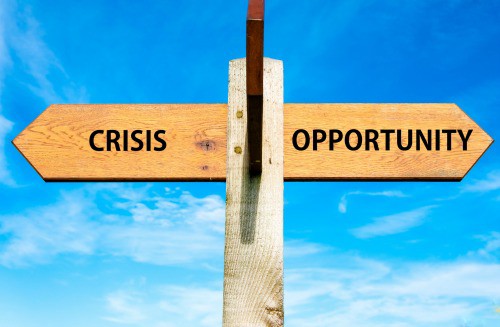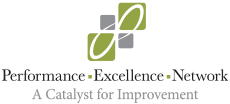
Never Waste a Good Crisis: 10 Leadership Lessons from the Last Year – April 2021
April 26, 2021
Never waste a good crisis. Winston Churchill was credited in first using that phrase toward the end of World War II, and there’s some real wisdom in the statement: if you’re experiencing challenging times, you might as well learn and benefit from them to emerge stronger “on the other side.” After all, life’s biggest lessons usually come from overcoming obstacles, rather than coasting during easy times.
The last 13 months were not easy times – they tested us in many ways. Though we’re not completely through this challenging time, for many of us, that proverbial “light at the end of the tunnel” appears to be brightening. And, while a few inevitable bumps still wait ahead, it’s probably a good time to start reflecting on just how much we’ve learned as leaders and professionals this last year – insights and lessons that should carry through “on the other side.”
A simple search on “biggest leadership lessons from COVID” produced 28 million responses. I didn’t read them all (!), but some – like articles from Forbes, Fortune, Harvard Business Review, MIT Sloan, Inc., Deloitte – offered some valuable insights. Here are 10 that I thought were particularly useful:
- Maintain an inventor mindset – during a crisis, you should question your long-held assumptions (did anyone really think 85% of the workforce could effectively work from home before we actually had to do it?!). Carve out more “pauses” during your days – more time to think (and allow your teams to do so as well). Be creative and entrepreneurial. Most problems can be solved through systematic innovation. Be patient and constantly look for better ways of doing things.
- Be human; appreciate relationships – if the last 13 months have taught (or reminded) us anything, it’s that humans are social creatures. Whether extroverted or introverted, we all need other people – we need relationships; we need social interaction; we need collaboration and co-creation. It’s easy to get lost in tasks, projects, and processes. But don’t lose sight of the importance of people – your team, your customers, your relationships.
- Show empathy and civility – we’ve all been through a lot the last 13 months, some much more than others. With the convergence of the pandemic, the recession, the heightened awareness of social inequities, and a host of other concurrent challenges, we’ve learned (or been keenly reminded) of the importance of sensitivity. Put yourself in others’ shoes, not just during crisis but all the time. Don’t make assumptions, other than to assume positive intent.
- Build a culture of transparency & connection – transparency, open communication, and authentic collaboration have always been important for a healthy organizational culture. With the onset of virtual and hybrid work environments and with ever-increasing uncertainty, the last 13 months have made them essential. Leaders need to remember to constantly communicate with their people, especially with distributed and remote teams. Leaders also need to create a environment that continues to facilitate honest conversations (on tough topics like racial equity mental health, and political differences). People need to understand differences; relationships require openness and trust.
- Appreciate the value of time – for many (or most) of us, the pandemic has provided an opportunity to slow down – fewer in-person meetings, less travel, a less chaotic pace in general (recognizing the exceptions, as some industries are busier than ever). Most of us have had significant periods of working from home, providing an opportunity to blend our professional and personal lives. Be aware of the value of time, one of our most precious (and finite) resources: set priorities, be authentic, maintain boundaries, strive for balance. There’s a temptation to just “go back” to our previous work routines, but I think there’s a real opportunity to change how (and where) work gets done, recognizing the efficiencies (and the preferences) of different arrangements for different types of employees.
- Maintain organizational agility, resilience – rapid response is no longer a luxury. As we all learned (some with great pains), the external environment can change quickly and unpredictably. Leaders and organizations need to find ways to systematically and quickly shift – shift processes, supply networks, business models and strategies, or work environments. Agility requires flexibility (in terms of both thinking and systems), the ability to plan for a variety of scenarios, and the willingness to experiment and take intelligent risks. It’s been said that resilience is about bouncing back, but I’d argue is really about lunging forward. More ideas on how to develop a resilient organization were in my December article.
- Focus on the ultimate goal – in crisis, there usually is a lot of noise – conflicting priorities, constantly changing variables, raw emotions. Though crisis requires making rapid decisions to navigate a constantly changing landscape, those shifts should be made with an eye on the ultimate long-term goal. The path may constantly change, but the destination usually is the same. Stay focused; stick to priorities and to what’s truly important – your purpose, your core values, and your ultimate vision.
- There is great value in sensemaking – the challenges of the last 13 months highlight the importance of sensemaking – coming up with effective ways to make sense of the increasingly complex world we’re living in. Even before COVID, we were experiencing accelerating rates of change in technology, market needs, science, and other variables. Discovering ways to sort through the chaos helps leaders and teams navigate pathways forward (for a great summary of the Cynefin sense- and decision-making framework, check out this HBR article).
- Value diversity and strive for true inclusion and equity – the events of the last year have reminded us that achieving true (racial & human) equity – in our organizations and our communities – requires introspection and confronting personal biases, but also tough system changes. It’s not just the right thing to do, but a smart business thing to do: there is a tremendous business case for investing in DEI (see my blog last month). It’s time to move beyond slogans and training and really make some change to promote inclusion and equity.
- Self-care isn’t selfish – with crisis comes stress. Over the last year, we’ve all faced uncertainty, fear of loss – or actual loss (of health, of life, of jobs or our businesses), and have endured what seems to be an increasing among of negativity and toxicity in our communities. All of this takes a toll on mental and physical health, reminding us all how important it is to find ways to take care of ourselves – proper sleep, diet, exercise, perhaps meditation or yoga. Whatever works for you as an individual, here’s to hoping the new healthy behaviors we’ve established the last 13 months remain as healthy habits in a post-pandemic world. For us to take care of our families and our organizations, we must take care of ourselves. More ideas on managing stress was in my September article.
PEN just announced last week the theme from our upcoming annual conference, PENworks 2021: BACK TO THE FUTURE – Innovating Today; Imagining Tomorrow (“Earliest Bird” discount ends tomorrow, by the way — information here). The conference committee selected the theme with the recognition that we all are ready to move forward to whatever’s next – that we’ve all been somewhat forced to shift and innovate just to survive this last year, but that as things continue to improve, we’ll begin imagining a better tomorrow. Before we fully move back to the future, though, let’s all continue to reflect on what we’ve learned from the recent past. The definition of resilience is bouncing back better than before; the insights we’ve all gained these last 13+ months can certainly help us do that.
One final thought: the current crisis will eventually end. But continued (and growing) uncertainty in the world seems to be inevitable. As change continues to accelerate – and as environmental factors seem to hint at ongoing turbulence – leaders need to rethink their assumptions about constancy. There really is no going back to yesterday, but only navigating increasingly complex tomorrows. Let’s leverage the insights off of the last year to lead us to an upcoming year(s) of great reflection, awakening, and resiliency.
What other insights/tips do you have regarding the leadership lessons we’ve all learned through this crisis? Participate in a discussion on this topic: visit our LinkedIn group to post a comment. And follow me on Twitter @LassiterBrian!
Stay healthy and never stop improving!
Brian S. Lassiter
President, Performance Excellence Network
www.performanceexcellencenetwork.orgCatalyst for Success Since 1987!




